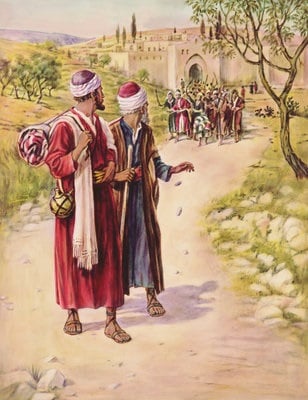Thursday: Lystra and Derbe
The next place Paul and Barnabas visited was Lystra, an obscure village some eighteen miles (about 29 km) southwest of Iconium. Though they spent some time there (Acts 14:6-7, Acts 14:15), Luke reports only one story and its developments: the healing of a lame man, probably a beggar, who suffered from that malady from birth.
Read Acts 14:5-19. What did their reaction to Paul reveal about just how steeped in ignorance the people were?
The crowd was so impressed by the miracle that they mistook Paul and Barnabas for gods—Barnabas for Zeus, the supreme god of the Greek pantheon, and Paul for Hermes, Zeus’s attendant and spokesman. In fact, the people wanted to offer them sacrifices.
Latin poet Ovid (43 B.C.-A.D. 17/18) had earlier recorded a legend of these same two gods disguised as humans visiting a town in the same area (“the hills of Phrygia”) and seeking a place to rest. According to the legend, a humble, elderly couple treated them kindly and with hospitality; the rest of the people were indifferent. Because of their kindness and hospitality toward the incognito visitors, the couple had their house transformed into a temple and themselves into priests, while the rest of the town was completely destroyed (Metamorphoses 611-724).
With such a story circulating in this region, the reaction of the people to Paul’s miracle comes as no surprise. The story also helps to explain why the crowd assumed that the missionaries were those two gods, and not Asclepius, for example, the god of healing. Paul and Barnabas, however, were able to stop their false worship of themselves. In the end, some opponents from Antioch and Iconium caused a complete reversal of the situation, and Paul was stoned and taken as dead.
Read Acts 14:20-26. Where did Paul and Barnabas finish their journey? And what did they do on their way back?
| Paul said: ”We must through many tribulations enter the kingdom of God” (Acts 14:22, NKJV). What does that mean? How have you, perhaps, experienced what he is saying there? Most importantly, how can you learn to grow in faith from whatever “tribulations” you are facing? |


Facebook has introduced the notion of instantaneous fame to us. If you show a photograph or make a comment that people “like” and share often enough for it to become viral then suddenly you are famous. And just as suddenly you are forgotten or worse, you get trolled. Crowd pleasure and displeasure is a fickle thing.
Paul and Barnabas experienced this fickleness when they healed the lame man in Lystra. Suddenly the crowed loved them and wanted to fete them as gods. Then the Jews persuaded the crowds that these two were imposters, and just as suddenly the stones were flying and they were dragged out of the city to be left for dead.
The experience of Paul and Barnabas is a reminder to us that we are not Christians for either fame or persecution, but because we have a relationship with Jesus. Our faith has to survive both fame and persecution. And sometimes I think that fame is perhaps the harder issue for us to deal with.
God bless you for your comments.
Paul’s and Barnabas’s focus was always preaching the gospel.
They did not go into the cities to do miracles.
The miracle merely attracted attention.
The miracle itself did not save anyone.
The man heard the message
The change was observed by Paul. Our change in lifestyle must be observable by others.
The action of faith. This man leaped and walked. By faith, he jumped up.
Very important point you made concerning the observable change true conversion will bring. Look at Saul/Paul. From “stoning” others to being stoned himself. From arresting others to becoming eventually a prisoner in chains.
The Psalmist shares this principle and it’s results in Ps 40:1-3.
Indeed human beings will praise you in one breath and berate you in the next. It was the same crowd that chanted hosanna, waving palm branches and spreading there garments for Jesus to ride on who cried in murderous voices crucify Him. We should not be so concern about the praises of men but be focused on the approval from our heavenly Father…well done thou good and faithful servant.
So, brother Maurice, are you somehow disparaging the usefulness and blessings of Facebook? I joined FB from advice of a friend who suggested that I become a FB friend of a lady that was losing her husband to cancer so that I could keep in touch with her on where the particulars of the memorial services etc. I did just that and the wife never accepted my FB friendship. For years I only had about 10 FB friends. I seriously thought of dropping FB about three different times but have since chosen to stay as now I have about 130 FB friends and enjoy the FB fellowship and their regular Godly and practical input there.
I used to do a lot of research on Facebook and have a reasonable understanding of how social networking functions. It is fair to say that if you understand the media you can use it to advantage. However, it is a very fickle environment and it is very easy for things to go wrong in a very public way. For what it is worth, I choose not to debate or comment on contentious issues in the uncontrolled public Facebook environment. This lesson blog is not the place to discuss the issues of using Facebook, but maybe I will write a discussion post about Social Networking one day so we can discuss it.